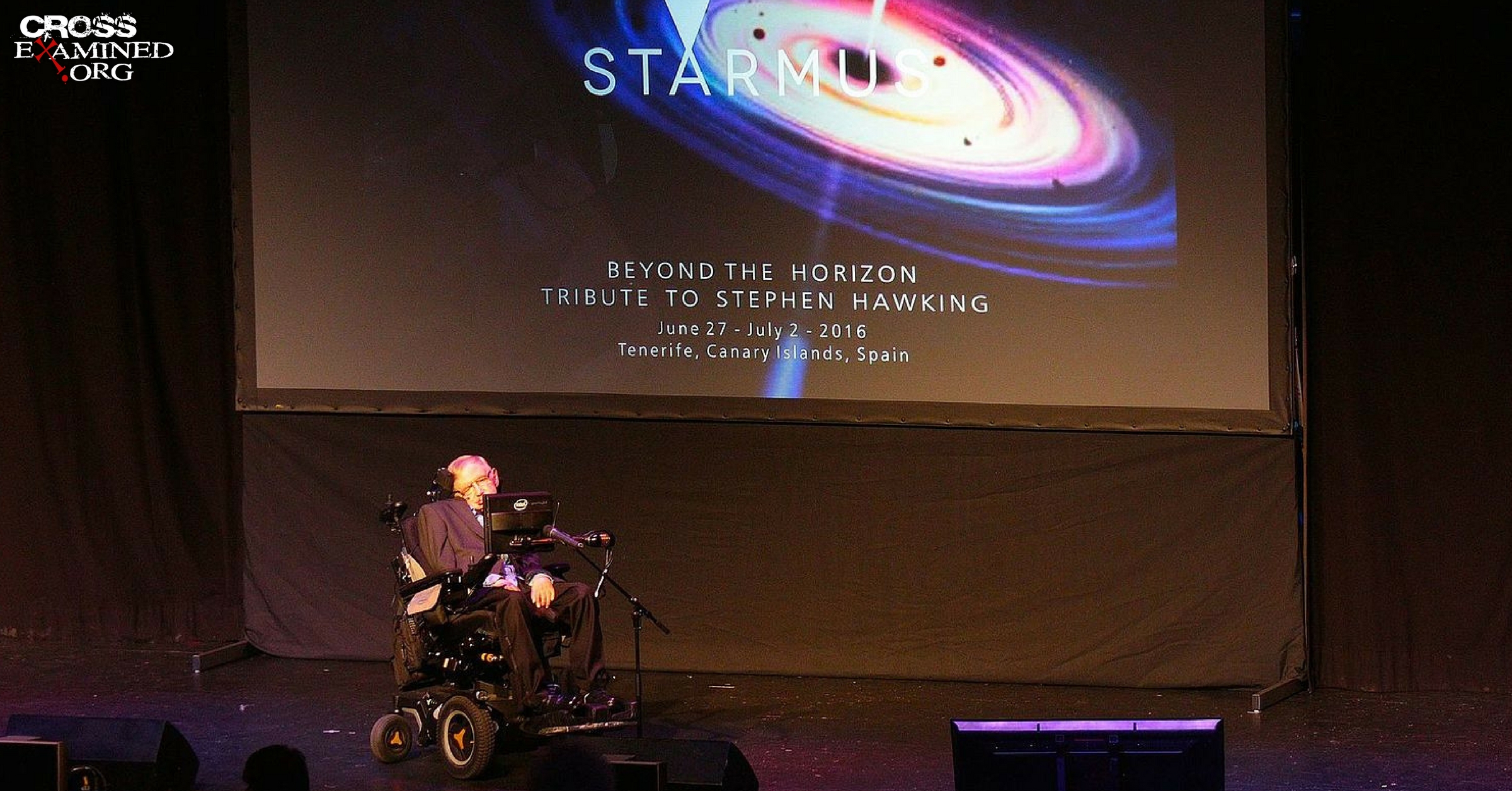El famoso físico, cosmólogo y autor Stephen Hawking murió. Era ampliamente conocido como uno de los científicos más brillantes de nuestro tiempo.
También era ampliamente conocido por ser ateo.
De hecho, muchos de los científicos más famosos de la actualidad son ateos.
Este punto no ha escapado a la atención de los escépticos que a menudo promueven la idea que la ciencia y Dios están en conflicto. Como evidencia de ese supuesto conflicto, los escépticos a menudo afirman que prácticamente ningún científico cree en Dios. Respaldan su aseveración citando una investigación de 1998 que mostró que el 93% de los miembros de la Academia Nacional de Ciencias (una organización científica de élite en los Estados Unidos) no creen en Dios. Ese hallazgo captó la atención de los medios de comunicación, y desde entonces se cita continuamente como un hecho conocido sobre la relación de las creencias religiosas y las profesiones científicas.
Por ejemplo, Sam Harris quien es un popular neurocientífico y autor ateo escribió:
Aunque es posible ser un científico y aún creer en Dios, como algunos parecen serlo, no hay duda de que un compromiso con el pensamiento científico tiende a erosionar, en lugar de apoyar, la fe religiosa. Tomando como ejemplo la población de los Estados Unidos: la mayoría de las encuestas muestran que alrededor del 90% de las personas en general creen en un Dios personal, pero el 93% de los miembros de la Academia Nacional de Ciencias no. Esto sugiere que el pensamiento científico es poco compatible con la fe religiosa.
Mi propósito en este artículo no es diseccionar las creencias religiosas de Stephen Hawking. Solo me refiero a él aquí porque su muerte llevó este tema una vez más a la discusión pública. Mi objetivo tampoco es analizar si Dios y la ciencia entran en conflicto (me refiero a esto en varios capítulos de Talking with Your Kids about God –Hablar con tus hijos acerca de Dios–). En cambio, mi intención es ver si los científicos no creen en Dios y las implicaciones de la respuesta.
Si bien sabemos que la verdad no está determinada por la cantidad de votos, las estadísticas captan la atención de las personas y los jóvenes confían especialmente en la “opinión de expertos”, por lo que vale la pena que como padres dediquemos tiempo para explorar este tema. Cuando tus hijos preguntan por qué los científicos no creen en Dios (porque han escuchado que esa es una conclusión inevitable), esta es la discusión que deben tener.
¿Qué creen los científicos acerca de Dios?
Este es el tema del Capítulo 12 en Talking with Your Kids about God (Hablar con tus hijos acerca de Dios), en el cual, explíco en detalle los cinco principales estudios de investigación que se han llevado a cabo sobre este tópico (con todas las referencias correspondientes). Voy a resumir brevemente los hallazgos aquí:
Estudio de James Leuba (1914) con actualización de Edward Larson y Larry Whitham (1996-98): en 1914, se descubrió que el 42% de los científicos creían en un Dios personal. Entre los científicos que Leuba identificó como “mayores” (científicos destacados), el número cayó al 28%. En 1996, Larson y Whitham intentaron replicar el estudio para conocer cómo los desarrollos científicos del siglo XX pudieron haber cambiado los puntos de vista religiosos entre los científicos. Sus resultados fueron casi idénticos: el 40% dijo que creía en un Dios personal. Para replicar el intento de Leuba de encuestar a un subconjunto de científicos de élite, Larson y Whitham encuestaron a la Academia Nacional de Ciencias. En ese grupo, la creencia en un Dios personal cayó al 7%. Este es el estudio específico al que se hace referencia con frecuencia para demostrar que los científicos no creen en Dios.
Estudio de religión entre académicos científicos (2005-08): la socióloga Elaine Howard Ecklund encuestó a casi 1700 científicos de 21 universidades de élite sobre sus puntos de vista sobre religión y ciencia. Descubrió que casi el 50% se identificó con una etiqueta religiosa. Es importante destacar que Ecklund llevó a cabo análisis estadísticos para identificar qué factores eran los predictores más significativos de creencias y comportamientos religiosos. Encontró que el predictor más fuerte de adherencia religiosa era la religiosidad infantil. En otras palabras, los científicos criados con una afiliación religiosa eran más propensos a ser religiosos como adultos, y aquellos criados sin afiliación religiosa eran más propensos a ser irreligiosos como adultos. Ecklund concluye:
Es una suposición de mucho trabajo académico afirmar que las creencias religiosas de los científicos corresponden a su compromiso con la ciencia. Los hallazgos presentados aquí muestran que, de hecho, los académicos de las ciencias naturales y sociales de las universidades élite de investigación son menos religiosos que muchos de los que pertenecen al público en general, al menos según los indicadores tradicionales de religiosidad. Asumiendo, sin embargo, que convertirse en científico lleva necesariamente a la pérdida de compromisos religiosos es insostenible si tenemos en cuenta la selección diferencial que hacen los científicos procedentes de ciertos trasfondos religiosos. Nuestros resultados indican que las personas de ciertos orígenes (los no religiosas, por ejemplo) de manera desproporcionada se inclinan a profesiones científicas.
Estudio del Pew Research Center (2009): los hallazgos sugieren que los científicos tienen aproximadamente las mismas probabilidades que el público en general de creer en Dios o en un poder superior.
Estudio de Entendimientos Religiosos de la Ciencia (2012-15): Ecklund realizó otro estudio que incluyó 574 científicos. En esta encuesta, el 36% de los científicos dijeron: “Sé que Dios realmente existe y no tengo dudas al respecto”, frente al 56% de la muestra general.
Consideremos ahora las implicaciones de estos estudios.
- No es cierto que el 93 por ciento de los científicos no creen en Dios.
Esta estadística frecuentemente citada se refiere solo a uno de varios estudios disponibles, y hay dos buenas razones por las que no deberíamos considerar que es un dato representativo.
En primer lugar, de las otras investigaciones queda claro que este hallazgo fue un caso atípico: los otros estudios importantes sobre este tema sugieren que del 33 al 50 por ciento de los científicos creen en un Dios personal, con cifras aún mayores si incluimos a aquellos que creen más ampliamente en un poder superior.
En segundo lugar, este estudio se realizó con un grupo único de miembros de la Academia Nacional de Ciencias, una organización de aproximadamente 2,300 científicos que fueron elegidos por otros miembros. Podríamos especular todo el día acerca de por qué estos científicos en particular son menos propensos a creer en un Dios personal, pero la conclusión es que esta organización no es representativa de la comunidad científica en general.
Lo más que se puede decir de este estudio es que el 93 por ciento de los científicos que son miembros de la Academia Nacional de Ciencias y respondieron a la encuesta no creen en un Dios personal. Es muy impreciso sugerir que el 93 por ciento de todos los científicos son ateos porque esta no es una muestra representativa.
- La correlación no es igual a la causalidad.
En las estadísticas, la correlación simplemente significa que dos variables tienden a moverse en la misma dirección: en este caso, aquellos que son científicos tienden a ser menos propensos a creer en Dios. Esto no significa, sin embargo, que ser un científico necesariamente causa que alguien no crea en Dios. (Piénsalo de esta manera: en algunas partes del mundo, llueve casi todas las Pascuas, pero eso no significa que la Pascua provoca la lluvia).
Si determinamos que convertirse en científicos hizo que las personas dejaran de creer en Dios, podríamos tener razones para pensar que hay un conflicto inherente entre la práctica de la ciencia y el teísmo. Pero, por el contrario, el estudio de Ecklund entre la religión y los académicos científicos reveló que los irreligiosos simplemente tienen más probabilidades de convertirse en científicos en primer lugar. La investigación disponible no sugiere que los científicos se vuelvan irreligiosos como consecuencia de su ocupación, aunque esto es lo que suelen asumir los escépticos. Y si convertirse en irreligioso no es una consecuencia de su ocupación, entonces todo el tema de lo que los científicos creen acerca de Dios se vuelve rápidamente menos relevante.
- Lo que los científicos creen acerca de Dios no tiene ninguna relación con la existencia de Dios.
Si bien debemos explorar este tema porque a menudo se plantea como un desafío a la verdad del cristianismo, debemos recordar que, en última instancia, las creencias no son ciertas según quién las tenga. Son verdaderos porque corresponden a la realidad. Los científicos no tienen más experiencia en la realidad de la existencia de Dios que cualquier otra persona.
Para obtener más información sobre estos estudios y una guía de conversación completa para usar con sus hijos al hablar sobre este tema, consulte Talking with Your Kids about God (Hablar con tus hijos acerca de Dios) en las páginas 125-132.
Blog Original: http://bit.ly/2DQI3M6
Traducido por Rudy Ordoñez Canelas
Editado por María Andreina Cerrada










